So this dweeby-looking guy interrupts us, says he knows exactly what Jefferson would do. He’s got on big square glasses and red suspenders. Apparently, he’s an employee of Monticello, or anyway that’s what his name badge says. His name is Clive.
I say, “All right, Clive. You tell us what Jefferson would do.” It’s intended it to sound snippy even though I’m wearing a smile. I mean, who interrupts two perfect strangers to horn in on their private conversation?
“No,” he says. “I really do. I really know what Jefferson would do. I’m not just blowing smoke.”
“And how do you know this?” my wife wonders, not at all put out, but sincerely curious. My wife is like that. Everybody gets the benefit of the doubt.
“I met him,” says Clive, as simple as that. He takes off his glasses and starts cleaning them.
Jefferson as a Bigot
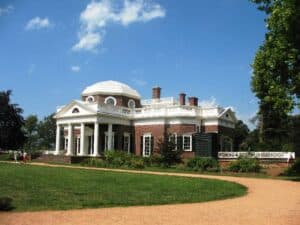
Monticello, begun by Thomas Jefferson in 1786 and built throughout his lifetime, is the second most visited presidential home in the USA.
“Uh, I hate to break this to you, Clive, but Jefferson’s been dead for 200 years.” So now we’re dealing with a nut case, not just an ill-mannered dweeb.
“I was transported back in time,” says Clive, holding up his glasses, inspecting the lenses. He returns to wiping them.
“Well, that’s great, Clive,” I say, getting up and collecting the refuse from my lunch. “But we’ve got to get going. We’ll be late for the tour.”
We are headed toward the door when he says, “A black president, for example. Jefferson would be troubled by that.”
It’s the word troubled that gets me, not worried, bothered, pissed. It hints at something deeper, something more complicated. If Jefferson actually was upset by the idea of our having a black president, he would be troubled by it. As a bigot, Jefferson would be articulate.
So now he’s got me hooked. But I’ll be damned if I’ll cross back over to him. I’m still standing by the door, my wife beside me, when I say, “Jefferson hated slavery.”
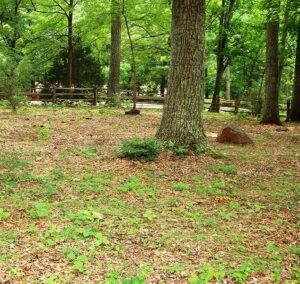
The African-American graveyard at Monticello. This is where Jefferson buried his hundreds of slaves.
Clive sort of shrugs. He’s conceding me this. He gets up and comes over. He’s still holding his fountain drink and takes a sip through the straw before saying, “Jefferson objected to slavery as a political matter. Morally his position wasn’t so clear. He released very few of his slaves upon his death, and the ones he did release were actually the relatives of his children.”
The truth of this is unassailable. These are known historical facts. So my objection is halfhearted and Clive cuts me off in mid-sentence. “Of course you can get any of this out of a book. But if you really want to know what Jefferson thinks, I can tell you. He was really quite chatty with me, once he got over the shock.”
I’ve had enough of this, and I’m about to push out the door when the wife pipes up, “Where did you meet him?” She’s a fan of sci-fi. She can’t help it.
I give her a pained expression.
“Come on,” says Clive. “I’ll show you.”
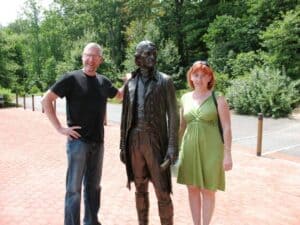
Tourists were posing with the life-sized statue of Jefferson at Monticello. We passed them and went into the woods.
Isn’t This Fun? Visiting the Cemeteries at Monticello
Monticello, begun by Thomas Jefferson in 1786 and built throughout his lifetime, is the second most visited presidential home in the US. To get there is like peeling back the layers of an onion. First, you must proceed 3 miles from nearby Charlottesville, Virginia and then go another 1.75 miles along bucolic Route 53 to the entrance road, proceed another quarter mile to the visitor’s center, and then take a shuttle bus another quarter mile to the house. Our escort has a different idea. He leads us down a path to the African-American graveyard, the only site at Monticello south of the visitor’s center and nearly a half mile from the house. Not much more than a clearing in the woods, this was where Jefferson buried the hundreds of slaves he owned.
“Jefferson believed the slaves would be unable to support themselves in freedom,” Clive explains. “He wanted them expatriated to Africa. He was dead certain if they remained in the United States they would become a burden to society, maybe even a danger.” Then Clive sort of smiles. “You should’ve seen his brows shoot up when I told him about Obama.”
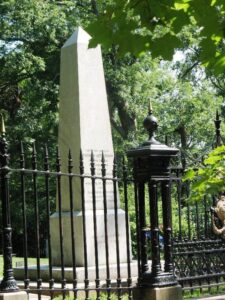
Thomas Jefferson’s grave. The obelisk is inscribed with the accomplishments Jefferson considered his finest.
The wife gives me a perky look as if to say, Isn’t this fun?
I roll my eyes.
Clive leads us back through the red brick courtyard of the visitor’s center, past the pavilions housing the ticket center, orientation theater, gallery and café, where we met him. He leads us up the steps to the shuttle bus stop where we pass a couple of silly tourists posing in front of the life-sized bronze statue of Jefferson. We pass them and proceed down the path into the woods.
A quarter mile on we come to the family graveyard presided over by the 10 foot obelisk of Jefferson’s grave. The great man’s epitaph reads: “Author of the Declaration of Independence, of the Statute of Virginia for Religious Freedom, and Father of the University of Virginia”. These were the accomplishments Jefferson considered his finest. He was especially proud of his founding of the University of Virginia as a secular institution at a time when most universities were religious in nature.
Clive recalls Jefferson’s delight at being told that not only was the University of Virginia still a secular institution but that most American universities have no religious affiliation today, that his model is now the rule. “He was practically giddy,” says Clive. “But then his face fell when I told him of the deplorable condition of American education. He asked me if the people were fearful.”
“Fearful?” asks my wife.
“Jefferson nailed the fact that the electorate would become fearful and defensive if they were not sufficiently educated. When I told him about 9/11, he
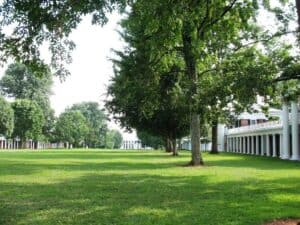
Campus at the University of Virginia. Jefferson was delighted to find it had remained secular all these years.
shook his head, but when I told him about the Patriot Act, he pounded his fist down on the table and walked away. He said, ‘Those who surrender freedom for security will not have, nor do they deserve, either one.’”
It occurs to me now that Clive’s little game is just a way of promoting his political biases, and I try again to get away from him by saying that we’ll miss the shuttle bus if we don’t hurry, but the wife insists we follow Clive to the house where he has promised to show us where it happened, where he met Thomas Jefferson after traveling back in time. I go along—reluctantly.
Looking out the Window in 1797: The Plantation at Monticello
We enter the grounds of Monticello from the rear, proceeding down the 1,000 foot-long section of the “roundabout” that encircles the house called “Mulberry Row”. In the 1770’s Jefferson planted Mulberry trees along here. Beneath their spreading branches Jefferson’s work force resided, blacksmithing, smoking meat, manufacturing nails, crafting architectural elements for the house. Today, most of the buildings are gone save for a foundation or a half-crumbled chimney.
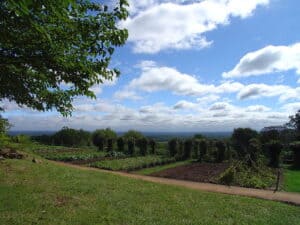
Beyond Mulberry Row, stretching away into the distance for over a thousand acres was the plantation.
Clive tells us that when he looked out the window of Monticello in 1797 and saw Mulberry Row he was astonished at the activity. “It was like a thriving village. There were 17 buildings of all shapes and sizes and people were everywhere.”
Beyond Mulberry Row, stretching away into the distance for over a thousand acres was the plantation. Here Jefferson’s slaves worked the fields, growing tobacco, corn and wheat. Clive claims that it was filled with people that day, when he looked out the window.
“I told Jefferson that agriculture in the United States had been taken over by a handful multi-national corporations using advanced machinery and genetics, and that the individual family farmer was a thing of the past. When he heard that, the blood drained from his face.
“He asked what most Americans did for a living if they didn’t farm. ‘Mostly they just try to get people to buy stuff,’ I told him. He seemed puzzled by that. He wondered how such an economy could be sustained. I told him that it was a global economy, that there were a lot of people to buy stuff. But he seemed unsatisfied with that answer.”
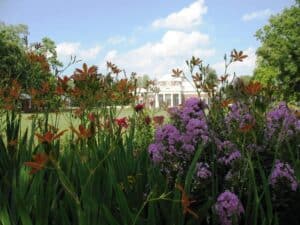
“No occupation is so delightful to me as the culture of the earth, and no culture comparable to that of the garden.”
The House at Monticello: Jefferson’s Gorgeous McMansion
Clive leads us up the path through the flower gardens to the rear of the house. Jefferson once said, “No occupation is so delightful to me as the culture of the earth, and no culture is comparable to that of the garden.” Jefferson laid out 20 oval-shaped flower beds at the four corners of the house as well as orchards, a vegetable garden and an ornamental forest he called “the Grove”. All are in evidence today.
The house at Monticello is a three-story, 21-room affair. By today’s standards, the living quarters are not large. Taken altogether, the square footage is about the same as the average ex-urban McMansion. But the architectural layout is unique, consisting of nine rooms surrounding a central hall and parlor.
Jefferson was inspired by the neoclassical houses he had seen in Paris during his tenure there as American ambassador. He incorporated many of the architectural features he had seen, as well as upholstery fabrics, furniture, ceramics and silver. Jefferson had refined tastes. As much as he fancied himself a man of the people, Jefferson was a no-holds barred aristocrat.
Perhaps that was because Jefferson didn’t perceive as much difference between the landed gentry and “the people”. For Jefferson, “the people” meant “the people of influence and means”, not everybody. He famously said, “We in America do not have government by the majority. We have government by the majority who participate.”
Clive reminds us of that as we stand in the house’s library where Jefferson, a voracious reader, compiled a collection of over 6000 books. “He couldn’t believe it when I told him that today everyone has the right to vote, even women. He wanted to know who played the piano and entertained. He wanted to know who did the chores. When I told him we had machines to do all that, he marveled. He wanted to know more about the machines. He insisted that I tell him about recorded music and washing machines and dishwashers and indoor plumbing. He sat there grinning and occasionally slapped his thigh and threw back his head and laughed.”
Time Traveling with Clive
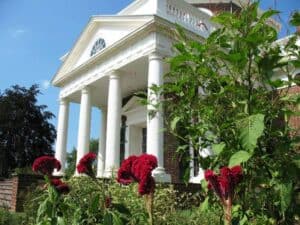
The west portico of Monticello where Clive was sweeping up just before he passed out and traveled back in time to meet Jefferson.
Then Clive leads us into the next room. This is Jefferson’s Cabinet (what we would call a study today) where Jefferson did most of his thinking. The next room, connected by a pass-thru, was where Jefferson slept and where, Clive claims, he himself came awake after passing out on the West Portico while sweeping up after closing time on a brutally hot day last July. “I felt myself getting dizzy, so I sat down. The next thing I knew I was out cold.”
Clive awoke in Jefferson’s bed surrounded by three or four curious faces and the great man himself in a powdered wig and frock coat. Jefferson was fingering the fabric of Clive’s lightweight cotton shirt and studying it through a magnifying glass. “Do tell me, sir, what is the source of this magnificent weave?”
Clive told him he had gotten it at Walmart. Jefferson confessed he was unfamiliar with that plantation and wondered if it was somewhere in the Carolinas.
Jefferson’s slaves had discovered Clive lying face down on the West Portico and reported him to the master who was about to dismiss him as a vagabond or penitent when he noticed the unusual nature of his attire.
Jefferson pored over the neatly sewn hems on Clive’s khakis, the stretchy elastic in his Hanes crew socks, the printed plastic and imbedded safety pin of his name tag and the incomprehensible arrangement of plastic, rubber and mesh that were his Nikes. When Clive told Jefferson he was from the future, Jefferson had no trouble believing it.
They talked for hours. Jefferson was mesmerized by Clive’s accounts of the America that would someday be. The history that had unfolded between his time and ours. News of the civil war wounded him, abandonment of our neutrality in two World Wars set him to brooding, and the growth in influence by corporations and speculators made him visibly angry.
Jefferson had plenty to say on those subjects, but after awhile Clive sized up his unique situation and began probing Jefferson for his views on the challenges we face today.
Getting Answers: What Would Jefferson Do?
Clive explained to Jefferson about our current defense budget and the ongoing wars we’re involved in. He asked Jefferson if he thought it was necessary to spend so much to defend the nation.
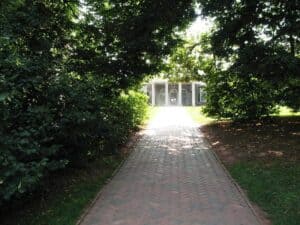
“If you want to live in a Democracy, you will go boldly in search of the answers. If not, you will live in tyranny.”
Jefferson said, “I had always hoped our wisdom would grow with our power, and teach us that the less we use our power the greater it will be.”
Clive explained that many of our conflicts have to do with oil and asked him what we should do about our addiction to energy.
Jefferson pointed to himself. “The greatest energy is here, in yourself. Mankind fed itself for thousands of years before the appearance of this oil you are so enamored with. When it’s gone, it will feed itself for a thousand more.”
But how? Clive wanted to know.
Jefferson said, “If you want to live in a Democracy, you will go boldly in search of answers. If not, you will live in tyranny. Don’t ask. Act! Action will delineate and define you.” ”
Clive explained that our military spending and social programs were bankrupting the economy.
Jefferson said, “To preserve your independence, you must not let your rulers load you with perpetual debt. You must make a decision between economy and liberty, or profusion and servitude.”
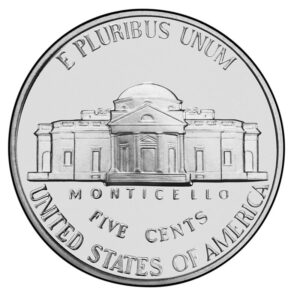
“To preserve your independence, you must not let your rulers load you with perpetual debt. You must make a decision between economy and liberty, or profusion and servitude.”
And what about taxes, Clive wanted to know. Shouldn’t the government raise taxes to balance the budget?
“Taxes must be by the consent of the governed,” replied Jefferson. “If the people will give of their own accord for some worthy enterprise, that is good. But if the government compels a man to give for a cause he doesn’t believe in, that is tyranny.”
And what if the government can’t pay its debts?
“Than the government is insolvent,” said Jefferson, “and must fold. They spent themselves into this, and to the extent that you consented to their doing it, you must answer as well.”
Clive asked Jefferson about the bank bail out, whether it was advisable for the government to incur even more debt to save Wall Street and the big banks from their own greed and incompetence.
Jefferson frowned, “Your government is too much beholden to moneyed interests and not enough to the citizenry. When the government falls into the hands of lending institutions and moneyed incorporations, the end of your democracy is near.”
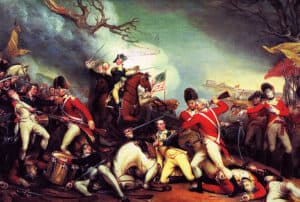
“Do not fear bloodshed. The tree of liberty must be refreshed from time to time with the blood of tyrants.”
Finally Clive asked Jefferson what he would do about the moribund economy, the lack of good paying jobs, the rising prices and the stagnating incomes of most Americans.
Jefferson’s answer was simple. “Go back to growing your own food, crafting your own products and making you own goods. Learn to trade among yourselves as your ancestors did. If the great beneficiaries of your economic system, the federal government, the banks and the corporations cannot provide the conditions under which you can prosper, than it is incumbent upon you to find a different way. If they try to hinder you, you must resist. Do not fear bloodshed. The tree of liberty must be refreshed from time to time with the blood of tyrants.”
Clive’s Take Away
It was getting late; Clive and Jefferson had been up talking most of the night. Jefferson insisted that Clive sleep in the bed in the chamber, as Jefferson had a second bedroom upstairs. Before going upstairs, Jefferson asked Clive one last thing. “How is this black president of yours doing?”
Clive shrugged. “All right, I guess. He didn’t cause all these problems, but then things haven’t changed much since he’s been there.”
“It sounds as if these problems have been a long time in the making,” said Jefferson. “They won’t be resolved over night. Were I your president I would ask for the patience of the electorate.”
“Oh, he has,” Clive said. “But some people have made up their minds to hate him.”
Jefferson nodded knowingly. “I have met such people,” he said. “They are the problem, not the solution.” With that, he retired for the night.
Clive blew out the candle and lay back on the pillows. Almost instantly he was asleep.
“Then I came awake on the West Portico,” Clive tells us.
My wife is sitting there slack-jawed. “Did you ask him about Sally Hemmings?” She is intrigued, as so many people are, by the fact that Jefferson slept with his slave and fathered several children by her.
“Oh no,” says Clive. “ That’s his personal business. Besides, it’s in all the books. I wanted to ask him about stuff we don’t know anything about.”
“So what was your take away, Clive?” I ask, rather glad this whole farce is coming to an end.
“Our problems are not so insurmountable,” he replies.”But we should probably stop looking for answers in the same old places. Banks, corporations and the government, they’re not going to help us. The money lenders, those who take bets, and those who prosper by taking more than they give, they are not the answer. We need to remember who we once were and get back to that. We need to take pride in ourselves, as Americans. That’s what Jefferson would tell us.”
I thank Clive and start to back away, but my wife holds me back. “Hold on,” she says. “I want to ask Clive something.”
“Sure,” says Clive, peeping out at us from behind those square glasses of his.
“Why us? Why did you pick us to tell your story to. And have you told anyone else?”
Clive chortles and shakes his head. “Of course not. I wouldn’t tell it to anyone I actually know. They would think I was crazy.”
And then Clive gives us a big, mischievous grin, and for the first time I’m beginning to like the guy.
Check it out…
Thomas Jefferson’s Monticello
931 Thomas Jefferson Parkway
Charlottesville, VA 22902
434-984-9822
Arrange a visit to Monticello
Previous stop on the odyssey: Washington DC //
Next stop on the odyssey: Bedford, PA
_________________________________________
Image Credits:
Clive the dweeb, Yuri Arcus; Monticello, Malcolm Logan; African american graveyard, Awadewit; Two tourists, Malcolm Logan; Jefferson’s grave, Malcolm Logan; University of Virginia, Malcolm Logan; Monticello plantation, Moofpocket; Gardens at Monticello, Malcolm Logan; North promenade, Malcolm Logan; West portico, Malcolm Logan; Thomas Jefferson by Peale, Public Domain; Front walkway, Malcolm Logan; Monticello on a Nickel, Public Domain; Trumbull painting of revolution, Public domain; Clive gives the thumbs up, Yuri Arcus
__________________________________________



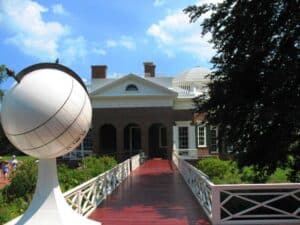
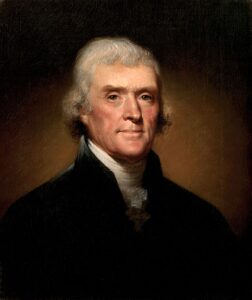

1 comment
Wonderful tale. I like Clive. Is he real? I wonder if he ever read the book “Thomas Jefferson, Rachel & Me,” in which a retired history teacher and his late son’s mixed race girlfriend meet the ghost of Jefferson at Monticello and take him off to see America.